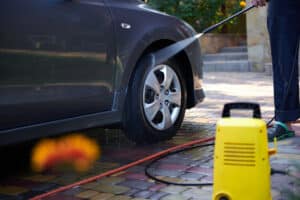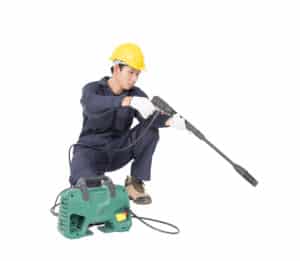Can I use my gas pressure washer to clean swimming pools or large outdoor areas?
Key Takeaways
- Gas pressure washers can be used to clean swimming pools made of plaster, exposed aggregate, or concrete.
- Gas pressure washers offer powerful cleaning capabilities, portability, and versatility for large outdoor areas.
- Considerations include higher upfront costs, noisy operation, regular maintenance requirements, gasoline fumes, and a heavier design.
Gas pressure washers are a powerful tool for cleaning various surfaces, but can they be used to clean swimming pools or large outdoor areas? Let’s explore the information available to answer this question.
Using a Gas Pressure Washer for Cleaning Swimming Pools
If you have a swimming pool constructed of plaster, exposed aggregate, or concrete, then using a gas pressure washer can be a viable option for cleaning. According to Pressure Washers Direct, these pool surfaces can withstand the high-pressure water spray without getting damaged.
However, it’s crucial to note that using a gas pressure washer for vinyl or fiberglass pools is not recommended. These materials are more delicate and susceptible to damage from the high-pressure water. In such cases, chemical treatments or non-abrasive cleaning methods are safer and more suitable.
Benefits of Using a Gas Pressure Washer for Large Outdoor Areas
Gas pressure washers are an excellent choice for cleaning large outdoor areas. Let’s take a closer look at their advantages:
- Powerful Cleaning Capability: Gas-powered pressure washers are the most powerful type available, making them suitable for tackling tough dirt, grime, and stains. They can produce higher pressure levels and more water flow than electric pressure washers (Yard Life Master).
- Portability: Gas pressure washers allow for easy movement around large outdoor spaces. Their mobility ensures efficient cleaning throughout expansive areas (Better Homes & Gardens).
- No Power Source Needed: Gas pressure washers do not rely on electricity, making them suitable for remote locations without access to power (Pressure Washer Wisdom).
- Versatility: Gas pressure washers can handle a wide range of cleaning tasks, making them a versatile tool for outdoor cleaning (Yard Life Master).
- Longer Lifespan: Gas pressure washers are built with durable components and engines, resulting in a longer lifespan compared to other models (Pressure Washer Wisdom).
Considerations and Drawbacks
While gas pressure washers offer numerous benefits, there are a few considerations and drawbacks to keep in mind:
- Higher Upfront Cost: Gas-powered pressure washers are generally more expensive than their electric counterparts. The initial investment may be higher, but it can be justified by their superior cleaning power and durability (Yard Life Master).
- Noisy Operation: Gas pressure washers can be noisier compared to electric models, which can be disruptive in residential areas or noise-sensitive environments (Pressure Washer Wisdom).
- Regular Maintenance and Repairs: To ensure optimal performance, gas pressure washers require regular maintenance and occasional repairs (Pressure Washer Wisdom).
- Gasoline Fumes: During operation, gas pressure washers emit gasoline fumes, which requires proper ventilation to ensure safety (Pressure Washer Wisdom).
- Heavier and Bulkier Design: Gas pressure washers are typically heavier and less portable than electric models, which can make transportation and storage more challenging (Yard Life Master).
- Fuel Storage and Safety: Gas pressure washers require proper fuel storage and adherence to safety regulations when handling flammable liquids (Pressure Washer Wisdom).
Conclusion
In conclusion, gas pressure washers can be used to clean swimming pools if they are made of plaster, exposed aggregate, or concrete. However, for vinyl or fiberglass pools, chemical treatments or non-abrasive methods are recommended. When it comes to large outdoor areas, gas pressure washers offer powerful cleaning capabilities, portability, and versatility. They are suitable for tackling tough dirt and stains, but they come with considerations such as higher upfront costs, noisy operation, regular maintenance requirements, gasoline fumes, and a heavier design. It’s important to weigh these pros and cons to determine if a gas pressure washer is the right choice for your specific cleaning needs.
Related Websites:
FAQs:
Q: What are the typical uses for gas pressure washers?
Gas pressure washers are commonly used for cleaning driveways, decks, and siding. They are highly effective in tackling tough stains, dirt, and grime.
Q: Are there any risks or damages associated with cleaning swimming pools using a gas pressure washer?
Yes, using a gas pressure washer to clean swimming pools can pose potential risks or damages if not used correctly. It is important to follow safety measures and precautions to avoid any harm.
Q: What safety measures should I follow when using a gas pressure washer?
When using a gas pressure washer, it is crucial to wear protective gear such as goggles and gloves. Avoid pointing the nozzle at people or delicate surfaces. Additionally, make sure to read and follow the manufacturer’s instructions.
Q: What are the alternatives for cleaning swimming pools?
There are alternative methods and tools specifically designed for pool cleaning. Pool-specific equipment or professional services can provide better results while minimizing the risks of damage.
Q: Can gas pressure washers be used to clean large outdoor areas other than pools?
Yes, gas pressure washers can be used to clean large outdoor areas such as driveways, patios, or walkways. However, it’s important to consider their limitations and adjust expectations accordingly.






